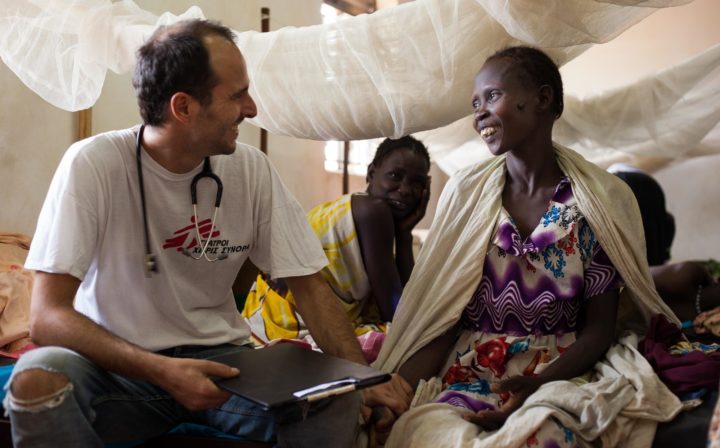Beth Cameron fought Ebola for the White House. Now she works to stop something even worse.
John Hackett and Charles Chiu handle Zika samples at the University of California, San Francisco-Abbott Viral Diagnostics and Discovery Center. Cody Pickens for TIME.
Enjoyed the episode? Want to listen later? Subscribe here, or anywhere you get podcasts:
When you’re in the middle of a crisis and you have to ask for money, you’re already too late.
That’s Dr. Beth Cameron, and she’s someone who should know. Beth runs Global Biological Policy and Programs at the Nuclear Threat Initiative.
She has years of experience preparing for and fighting the diseases of our nightmares, on the White House Ebola Taskforce, in the National Security Council staff, and as the senior advisor to the Assistant Secretary of Defense for Nuclear, Chemical and Biological Defense Programs.
Unfortunately, the nations of the world aren’t prepared for a crisis – and like children crowded into daycare, there’s a real danger that something nasty will come along and make us all sick at once.
During previous pandemics, countries have dragged their feet over who will pay to contain them, or struggled to move people and supplies to where they needed to be. Unfortunately, there’s no reason to think that the same wouldn’t happen again today. And at the same time, advances in biotechnology may make it possible for terrorists to bring back smallpox – or create something even worse.
In this interview we look at the current state of play in disease control, what needs to change, and how you can work towards a job where you can help make those changes yourself. Topics covered include:
- The best strategies for containing pandemics.
- Why we lurch from panic, to neglect, to panic again when it comes to protecting ourselves from contagious diseases.
- Current reform efforts within the World Health Organization, and attempts to prepare partial vaccines ahead of time.
- How the Nuclear Threat Initiative, with just 50 people, collaborates with governments around the world to reduce the risk of nuclear or biological catastrophes (also, whether they might want to hire you).
- Which global health security groups most impress Beth, and what they’re doing.
- What new technologies could be invented to make us safer.
- Whether it’s possible to help solve the problem through mass advocacy.
- What and where to study, and how to begin a career in pandemic preparedness (below you’ll find a lengthy list of people and places mentioned in the interview, and others we’ve had recommended to us).
- Much more besides.
Below you’ll find a coaching application form, three key points from the interview, extra resources to learn more, and dozens of people and places you can contact to begin a career in this field.
If you know nothing about this topic, it is recommended that you listen to the first hour or two of the episode with Howie Lempel first, as it lays out the problem more gradually.
Highlights
David Evans, an orthopox researcher in Canada has created horse pox, which was a previously extinct orthopox pox virus. The research itself is not technically surprising. Pox virologists and others have speculated for years that the creation of orthopox viruses like horsepox and smallpox was now possible by good researchers. The fact that it was done, it really basically gives new life to the argument that smallpox can be recreated from scratch [by bad actors]…That reopens the question about democratisation of synthetic biology and technology…
…one of the challenging things about biological threats is that it’s very hard to predict for any given scenario how many people would die simply because depending on where it starts, where it spreads, who gets on which plane, the speed of response, where it emerges or how it emerges – all of those things could greatly impact the numbers. The really important thing is that all countries really need to be able to quickly detect and stop outbreaks at the source before they become epidemics. In addition to that, we really need to be much better prepared to respond in real time than we were during the Ebola outbreak in West Africa.
One, we shouldn’t be pitting the need to respond to Zika – which was absolutely vital – against the ongoing need for global health security, and Ebola response and recovery in West Africa. Two, we shouldn’t be thinking about these things as emergency supplementals to begin with. When you’re in the middle of a crisis and you have to ask for money, you’re already too late. You need to have the ability to fund the work that you need to develop countermeasures, to improve detection capability, to create better diagnostics for new diseases that we didn’t know much or anything about, like Zika. We need to have that available to us in the government without having to ask for big boluses of supplemental funding in each case. It’s just not practical.
We need to be bold about how we’re thinking about these types of discussions … Recently, a number of countries and nongovernmental organisations came together and created the Coalition for Epidemic Preparedness Innovation, which is looking at new ways to quickly create and rapidly and equitably distribute vaccines and countermeasures for specific diseases. These types of public-private partnerships, where we’re thinking creatively about how to solve a problem and also not waiting forever to do it – we need to do more of that.
Articles, books, and other media discussed in the show
- From Panic and Neglect to Investing in Health Security: Financing Pandemic Preparedness at a National Level
- Call for Proposals: Next Generation for Biosecurity in GHSA Competition
- Open Philanthropys Grant: Planning Grant for Global Health Security Index
- Open Philanthropys Grant: Johns Hopkins Center for Health Security — Biosecurity, Global Health Security, and Global Catastrophic Risks
Related organizations
(Updated: April 2018)
Potential places to work, study or network mentioned in the interview
- Jobs at the Nuclear Threat Initiative
- AAAS Science & Technology Policy Fellowships
- Emerging Leaders in Biosecurity Fellowship
- Tom Inglesby’s lab at the Johns Hopkins Center for Health Security
- International Genetically Engineered Machine
- Synthetic Biology Leadership Excellence Accelerator Program
- Dr. Megan Palmer – Stanford University, Senior Research Scholar, Center for International Security and Cooperation (CISAC)
- Dr Dave Relman – Stanford University, Co-Director of the Center for International Security and Cooperation
- Global Health Security Agenda
- JEE Alliance
- Safe Genes Project
- 2018 American Society of Microbiology’s Biodefense Conference
- Next Generation Global Health Security Network
- Centers for Disease Control – Center for Global Health
- Department of State
- Georgetown University, Center for Global Health Science and Security
Other possible places to work, study or network not mentioned in the interview
The below is cribbed from a forthcoming extended problem profile on biosecurity:
Policy
- Graduate Degrees in Biodefense at George Mason University’s School of Policy and Government
- Prof Kenneth Oye – MIT, Director of the Program on Emerging Technologies
- Dr Caitriona McLeish – Harvard-Sussex Program on Chemical and Biological Weapons, Science Policy Research Unit
- Dr Brett Edwards – Lecturer, University of Bath, Department of Politics, Languages & International Studies
- Prof David Galbreath – University of Bath, Professor of International Security in the Department of Politics, Languages & International Studies
- Rebecca Katz – Georgetown University, Co-Director of the Center for Global Health Science and Security
- Julie Fischer – Georgetown University, Research Associate Professor in the Department of Microbiology
- Prof Irwin Redlener – Columbia University, Clinical Professor focussed on disaster preparedness and the public health ramifications of terrorism and large-scale catastrophic events
- Dr Stephen Morse – Columbia University, Professor of Epidemiology focussed on risk assessment of infectious diseases and improving disease early warning systems
- Dr Greg Koblentz – George Mason University, Director of the Biodefense Graduate Program
- The Belfer Center at the Kennedy School of Government at Harvard University is a think tank which does research on biosafety, chemical and biological weapons and hosts the Managing the Microbe project.
- Chatham House’s Centre on Global Health Security
- The Centre for Strategic and International Studies has a program on Health and Security
Technical biology
- Kevin Esvelt – MIT Assistant Professor, MIT Media Lab.
- Dr Jo Husbands – Board on Life Sciences of the U.S. National Academy of Sciences
- Prof George Church – Harvard Medical School, Professor of Genetics
Epidemiology
- Marc Lipsitch – Harvard T.H. Chan School of Public Health, Professor of Epidemiology
- Prof W. Ian Lipkin – Columbia University, Professor of Epidemiology and Director of the Center for Infection and Immunity
Social science
- Dr Jane Calvert – Reader in Science, Technology and Innovation Studies
- Dr Phillipa Lentzos – King’s College London, Senior Research Fellow in the Department of Social Science, Health and Medicine
- Dr Carlo Caduff – King’s College London, Director of the Global Health and Social Medicine Graduate School
- Prof Sam Evans – Tufts University, Research Assistant Professor in the Program in Science, Technology, and Society
Research groups
- James Martin Center for Nonproliferation Studies
- The Committee on Current Trends in Synthetic Biology, National Academy of Sciences
Other
Learn more
Related episodes
About the show
The 80,000 Hours Podcast features unusually in-depth conversations about the world's most pressing problems and how you can use your career to solve them. We invite guests pursuing a wide range of career paths — from academics and activists to entrepreneurs and policymakers — to analyse the case for and against working on different issues and which approaches are best for solving them.
The 80,000 Hours Podcast is produced and edited by Keiran Harris. Get in touch with feedback or guest suggestions by emailing [email protected].
What should I listen to first?
We've carefully selected 10 episodes we think it could make sense to listen to first, on a separate podcast feed:
Check out 'Effective Altruism: An Introduction'
Subscribe here, or anywhere you get podcasts:
If you're new, see the podcast homepage for ideas on where to start, or browse our full episode archive.





